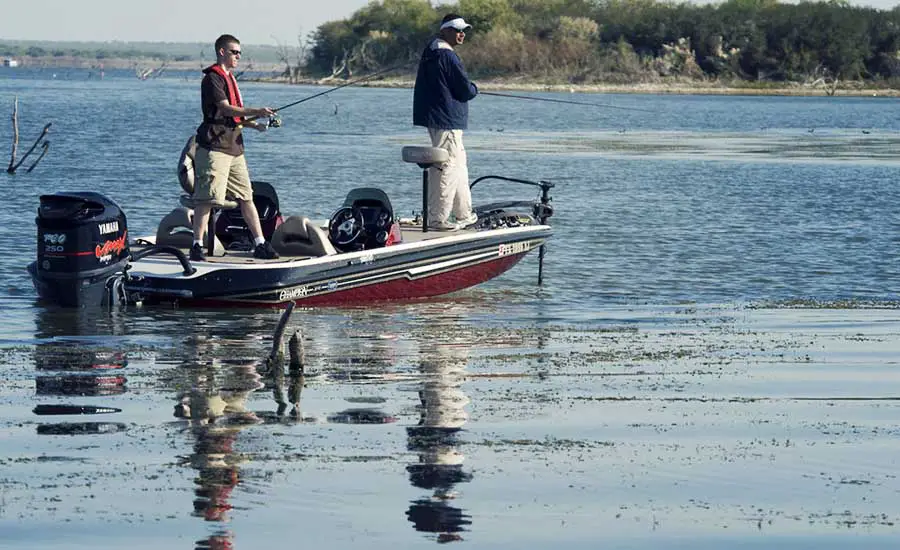There’s nothing better than being out on the water. Whether you like to cruise around, fish, or just hang out on your boat, spending time out on the water is one of the best experiences out there.
While many boating enthusiasts rent boats or hop on a friend’s vessel for a day on the lake, all boaters dream of someday owning their own boat.
At some point, those dreams may become a reality, and you’ll be ready to take the plunge into the world of boat ownership.
Ultimately, to confidently buy a used boat, you’ll need to go through a specific “to do” checklist of items like checking for wear and tear, checking for mildew/rot, taking it out for a test drive and a whole list of other crucial tasks outlined below!
Buying used is a great way to start your tenure as a boat owner without breaking the bank. That’s what I did.
But, buying a used boat can be fraught with difficulties, especially if you’re not used to the process. To help you get started on your journey to boat ownership, we’ve assembled the ultimate guide to buying a used boat.
I’ll start out with some insight into the boat buying process and wrap things up with our guide on what to look for when buying a used vessel. Let’s get right to it!
The Boat Buying Process
If you thought buying a boat was going to be as simple as picking up milk from the grocery store, you’re in for a bit of a surprise. Purchasing a marine vessel is a major commitment, so you want to make sure you do it right. Here’s what you can expect when going through the boat buying process:
Determining your budget
First things first, you need to determine your budget for your boat. Since a budget is an entirely personal decision, I can’t offer you much advice on how much to spend as we’re all in different financial situations.
But, I can tell you this: Don’t spend all of your savings. While you might be tempted to get that fancy, shiny new boat of your dreams, if it’s at the higher end of your budget or just above what you’ve mentally committed to spending, don’t do it.
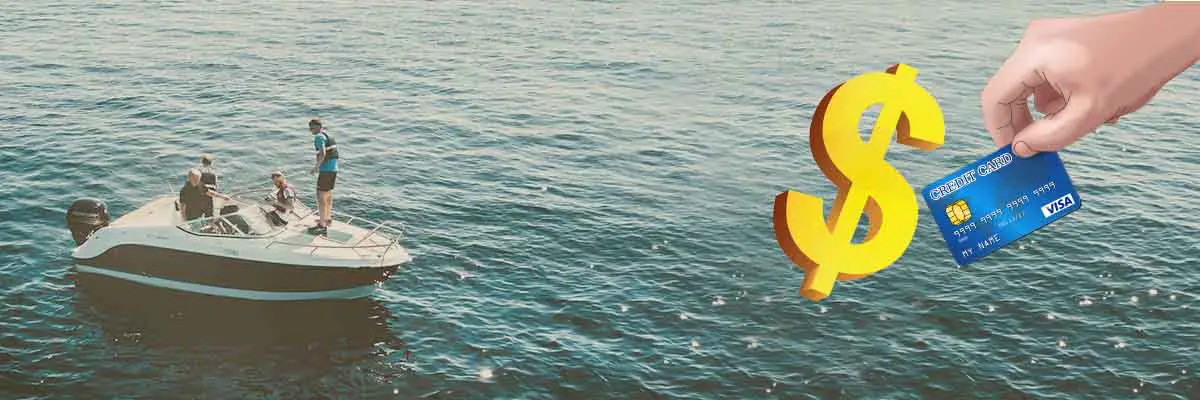
Although everyone has a different threshold for how much debt they’re willing to take on or how little they’re happy with having in their savings accounts, the costs of boat ownership don’t end when you purchase your boat. In fact, that’s just the beginning!
Boats tend to need repairs far more often than you’d like and those repairs cost just a bit more than you might be prepared for. Plus, you’ll have to pay for marina or dry storage fees, trailers, fuel, and other equipment just to get out on the water. So, play it safe and be conservative with your spending.
Choosing a boat type
Once you figure out how much you’re willing to spend, you can start to determine what kinds of boats are available to you. Again, much like the question of budget, the concept of what boat is right for you is entirely personal.
For more on how to choose the perfect boat for you and/or your family, you’ll love THIS ARTICLE.
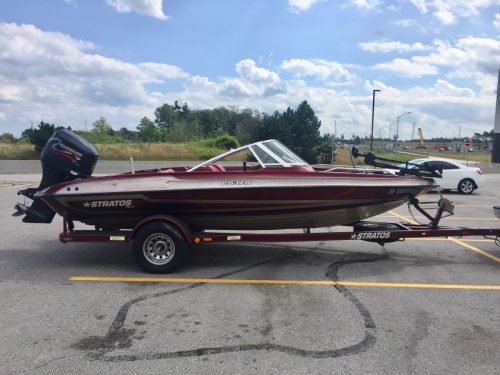

Choosing a type of boat may be challenging, but I was able to narrow it down very quickly based on budget and interests. I love fishing, my kids love tubing and I only had $10K to spend, so a used Fish & Ski was a no-brainer!
If you’re really into fishing and relaxing on the lake with the family, a pontoon might be a great choice, or you might opt for a large fish and ski boat which can fit the whole family.
Speed demons and adventure enthusiasts might prefer to own a RIB, while others might enjoy a luxury cruiser instead.
Thus, when choosing a boat type, you first need to determine the activity for which you’d like to use your boat. Once you decide what kind of boating you like to do, you can choose the right boat for your needs.
While you will be limited to some degree by your budget, there are usually a variety of different boats available within each category, so you’ll probably be able to find one that’s just right for your financial situation.
Why Should I Buy Used?
Now that you have an idea of how much you’re willing to spend and what kind of boat you want, it’s time to decide if you’re going to buy new or used.
Since you’re reading this article, you’re probably pretty dead set on buying a used vessel (that was my first and current choice option!), so I won’t spend too much time here.
Buying a used boat is a great option for people on a budget because there are so many different used boats available that are just looking for a new home.
With the right amount of time, patience, and knowledge, it’s quite possible that you’ll find the perfect new-to-you boat without spending your life’s savings.
Searching for options
Once you’ve decided on your budget, the type of boat, and whether or not you’re going to buy new or used, you can start shopping around and assessing your options. These days, the best place to start your boat shopping adventure is online.
With so many different websites and forums dedicated to buying and selling used boats, you’re more likely to find a boat online than in your local marina. Boats.com, Yachtworld.com, and Boattrader.com are all great options for starting your used boat search.
*Pro Tip: I highly recommend you purchase a used boat from a boat dealer. Each state may have different procedures for the purchase process and you may be in for some headaches along the way unless you take advantage of the experience of a dealer to take care of the proper paperwork and transfer of ownership.
I’ve found that it’s no more expensive from a dealer than it is privately, but you’ll get the peace of mind knowing that you can always contact them for further questions.
Plus, dealers know they have a reputation to maintain, so they’ll take some responsibility for the condition of the boat and your own satisfaction after the sale.
That is very much UNLIKE what you can expect when purchasing privately in most cases.
Take the time to peruse your options and start to make a list of the boats in which you might be interested. But, try not to become committed to anyone in particular just yet, as we have a few more tasks to get through before you become a boat owner.
Narrowing down your choices
After you start creating a list of the different boats available to you, you can narrow down your choices. Use the filter options to view only boats that are near your home location, that fit your desired price point, and are in your preferred boat type.
If you don’t mind driving a bit (like me) you can often find much better deals about 2 – 3 states away from you.
I drove from Buffalo, New York to South Windsor, Connecticut for my last boat, and my friends in the Western New York area were shocked when I told them what I paid for the boat. It was 40% less than comparable boats in my area!
Now that you have the boats you might be interested in, compare the photos of some of the more similar boat types to get an idea of what you need to look for with that particular vessel.
If you’re looking to buy a boat through a dealer, be sure to flip through all of their different boat offerings so you can get an idea of what their business is like and if they’re reputable enough to trust.
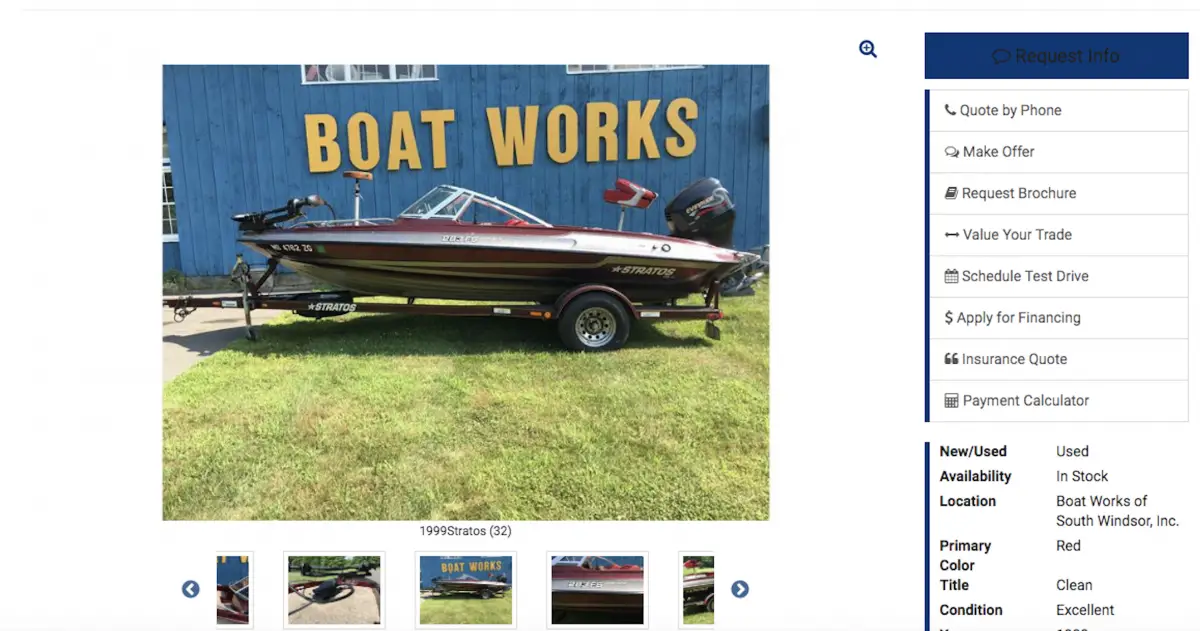

Be sure to check out all dealer offerings but also, widen your search to see deals from everywhere. That’s how we found our boat – 3 states away!
Finally, try not to get sidetracked by boats with lots of fancy gadgets. Many of these things get outdated quickly and will need to be replaced. Focus on the seaworthiness of the vessel itself and realize that you can always customize a boat later to fit your needs.
Walkarounds, sea trials, and surveys
At this point, you should have a selection of boats that have made it onto your shortlist. These are the boats that you’d be happy to own, but you still need to take the time to inspect the vessel.
Inspecting a boat doesn’t have to be an overly complex procedure, but it does need to be thorough if you’re going to avoid any unwanted surprises after you buy it.
If buying a boat is a major investment for you, you’ll want to be particularly careful about looking far deeper than a seller might want you to do, especially if you think that a boat deal is just too good to be true.
The first thing to do when inspecting a vessel is to do a walkaround. This is your time to check out the state of the boat and get an idea of how well it’s been cared for.
It will likely have some wear and tear and perhaps some more serious damage like a dent in the trailer or hull, or perhaps damage from rats and mice during storage. (Here’s an article on how you can prevent rodent damage once you get your boat!)
Do keep in mind, however, that it’s relatively easy to make a boat look good on the outside while neglecting the more important parts of boat maintenance and care.
After a walkaround, you should go out and take the boat for a spin on the water. This is your time to get an idea of if you actually like being on this boat and how it feels to handle it. Don’t treat this like a joyride, though.
Be serious about the sea trial and ask yourself if this is a boat you’d like to spend your time on for the foreseeable future.
Finally, if you really like the boat after taking it for a sea trial, you should ask to haul it out of the water and hire a professional surveyor to check for any potential hidden problems.
Most insurance companies will require a survey for your boat, and it’s a responsible thing to do before making a major investment, especially if your boat is over 30 feet long. Plus, why wouldn’t you want to learn everything you can about a boat before you buy it?
Become a boat owner!
Once you’ve found the boat of your dreams, it’s time to close the deal and buy your boat. Sometimes, there’s a bit of a negotiation process involved, so just be sure that you don’t let yourself get carried away.
After you nail down a price, check over the paperwork carefully to ensure that the person you’re buying the boat from actually owns the vessel
Check to make sure there aren’t any outstanding bills left on the boat and then get ready to sign your paperwork. Congrats, you’re a boat owner!
What to Look for When Buying a Used Boat
Now that you understand the boat buying process, you’re ready to understand some of the specifics of buying a used boat.
Unlike a new boat, a used boat has already spent some time on the water, which means there’s a higher likelihood that it will already have some issues.
When a boat is out on the water, there are innumerable small and myriad ways in which it can get damaged. Thus, as used boat owners to be, we need to be extra careful about inspecting our vessels before we buy them.
Here are some things to look out for when buying a used boat:
1. Check for signs of wear
As you might imagine, the more a boat is used, the more wear and tear it will experience. While this is part of the normal life cycle of a vessel, you don’t want to spend more money on a worn boat than you have to.
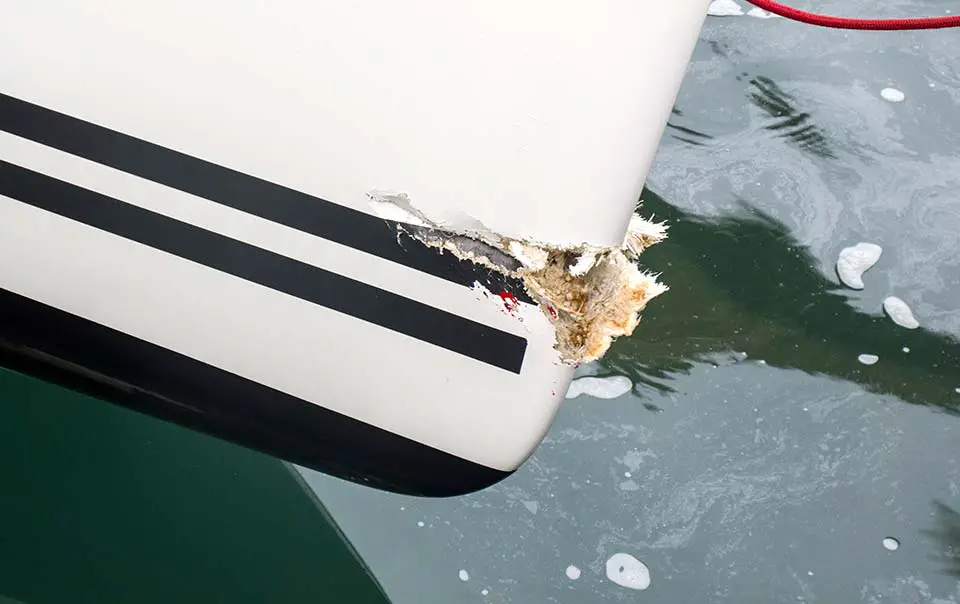

Be careful not to buy a really old boat that you’re not prepared to maintain and spend lots of $$ on. I’d stick with something no older than 20 years and in excellent shape for its age!
Plus, we all have a limit to how much we’re willing to spend in repairs after we buy a used boat, so you can probably use some of the information you find while inspecting the vessel to negotiate for a lower price.
Or, if the boat you’re looking at is too damaged, you might just have to take your business elsewhere.
In particular, when inspecting a used boat, you’ll want to pay lots of attention to signs of potential corrosion, which can spell trouble. Also, take a good look at the propeller and check for damage as these are expensive to replace.
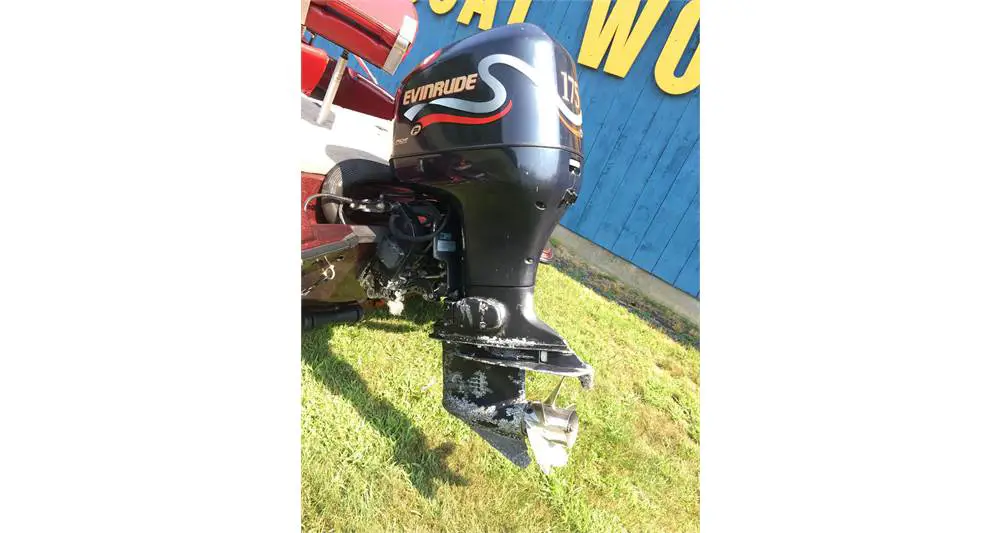

Here’s the motor from my recently-purchased boat. It has tons of corrosion around the propeller, but I knew a good sanding along with some paint and clear coat would take me about 3-4 hours and save me thousands of dollars!!
Be sure to look over the gel coat of the fiberglass hull, too, and check for any spider cracks or other signs of damage.
* Pro Tip: I have to mention here that when I bought my last boat (a fish ‘n ski boat), one of my requirements was that it contain NO WOOD! For some people, a gorgeous, urethane wood finish is a thing of beauty and to be desired.
For me, however, I see only potential for rot and replacement – especially if it’s unfinished plywood under the carpet on the deck of a bass boat! My boat contains only clear-coated fiberglass even under the carpeting and upholstery on the deck of the boat.
Thank you Lord!
2. Learn about the boat’s history
Every used boat has a story. As a potential used boat owner, you should learn as much as you can about your boat’s backstory before you buy it. Ask the seller if they were the first owner of the boat.
If not, learn more about where the boat came from and who owned it previously.
Talk to the seller and get an idea of if the boat has ever been in any accidents or seen a lot of damage. If so, get more information about what happened and who repaired the damage.
Whenever possible, ask for all of the maintenance records and get documentation about how it’s been stored over the winter.
Oh – and ask the owner about why they’re selling. Is it because the boat requires too much maintenance? If so, you might want to reconsider your decision.
This is where you have to be as discerning as possible, since many sellers won’t divulge any negative aspects of the boat or why they’re selling.
I doubt you’ll hear too many telling you the boat is way too expensive to maintain and will need major repairs soon! They know that’s a recipe for a lost sale for sure!
3. Inspect all of the boat’s instruments and safety equipment.
No one wants to be out on the water in an unsafe boat, so you’ll want to check out a used boat’s safety equipment before you buy it. During your walk around, check all of the instruments to make sure they’re in good working order.

Don’t get too sidetracked by the boat’s “good” features while ignoring the integrity of all gauges on the instrument panel. You’ll need them all sooner or later and if they’re faulty, you can use their repair as a bargaining chip.
All of the electronics should be good to go, or the owner should be willing to negotiate a lower price for faulty equipment.
Inspect the bilge pump to make sure it works and ensure that the battery is fully charged. All of the fittings for the fuel tank and other important equipment should be in good shape, too. If not, don’t buy the boat or talk to the owner about doing the necessary repairs.
4. Look for rot, mildew, and mold
When boats aren’t taken care of properly, they can be the perfect breeding ground for mildew and mold. Not only are mildew and mold hazardous to your health, but they can also point to a larger problem with the boat itself.
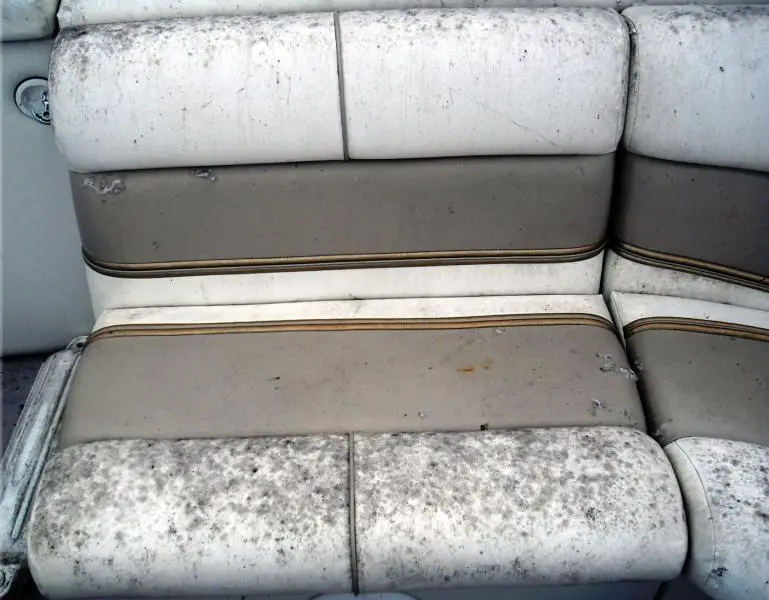

As you walk around, check the interior of the boat, especially wherever there is upholstery and carpet as these are common homes for mold and mildew.
Particularly when it comes to wooden boats, rot can be a huge concern. If you see any signs of rotting in a wooden boat, you’ll want to get a professional’s opinion on how much it would cost to fix and if the vessel is even worth the repairs.
Remember, a low price may betray the real condition of a boat, so look under the exterior facade for mold under carpets and inside storage compartments as well as the bilge.
As I mentioned earlier, I chose to stay away from wood altogether since it’s a typically perfect, natural home for mold and mildew which eventually turns to serious rot which costs a “boatload” of money (excuse the pun) to replace!
5. Inspect the boat trailer
If the boat you’re buying is towable, it will probably come with a trailer that requires the same amount of inspection and care as the vessel itself. Boat trailers are a huge investment, so you want to make sure that you’re getting one that’s worth your money.
When looking at a boat trailer, check the trailer for signs of corrosion, especially around the springs. You should crawl under the trailer, too and cheek for wear and tear on the bunks, especially where they attach to the trailer.
Additionally, the tires and breaks on the trailer should be in good condition, as should the brake and turn-signal lights.
The trailer inspection can be a little tricky since you can’t see too much of the bunks (the slats of wood that the boat’s hull is sitting on).
You’ll have to check out the trailer when the boat’s in the water, but that’s when the dealer wants to show you the boat itself, so you may have to explain the situation before things get awkward.
The brackets on our bunks were nearly rotted out, but I was able to change several while my boat was still on them. It may be challenging to remove the boat in order to fix a faulty trailer.
Finally, you’ll want to ensure that your vehicle can tow the boat you’re looking to buy. Check your truck’s owner’s manual to confirm its towing abilities. It may even be worth hooking up your truck to the boat’s trailers to see how it performs.
*Pro Tip: If you check your trailer and find several deficient qualities (like I did), that’s not necessarily a reason to abort your purchase. When I bought my last boat, I knew the bunks were attached to the trailer VERY poorly with bolts and brackets that were almost totally rusted out.
However, the purchase price was so low, that I had the budget to eventually repair the trailer and still come out in the black!
6. Take the boat for a spin and hire a surveyor
There’s no better way to see if you like a boat than to take it out on the water. As I’ve already discussed, a sea trial is a great way to get to know a boat and see how it handles.
Without a sea trial, you’re basically buying a boat without knowing how it performs, which is a huge risk.
Finally, I HIGHLY recommend hiring a third-party inspector or surveyor to take a look at the boat you want to buy. Especially when it comes to used boats, there’s so much that could go wrong, so it’s worth the time and expense to get a professional involved.
You can think of a boat survey as similar to home inspection – something you definitely don’t want to skip.
Enjoy Your New Boat!
Congrats! At this point, you’re more than ready to dive into the world of used boat ownership. You now understand the basics of buying a boat and are prepared to thoroughly inspect a used boat before you commit to it.
So, good luck and enjoy your time out on the water in your boat!

